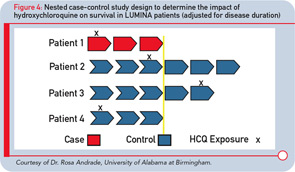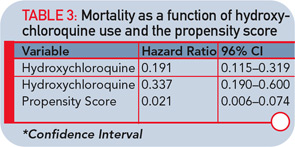3) The third salient contribution of LUMINA to the literature relates to the beneficial effects of hydroxychloroquine (HCQ) in terms of damage accrual (in general and in specific domains of the damage index) and survival. I should note that this area of investigation was first proposed by a young UAB colleague and LUMINA co-investigator, Dr. Barri Fessler. She approached me some time ago in the 1990s with the idea of exploring the possible protective effect of HCQ in lupus. Knowing that HCQ, by and large, was prescribed primarily to patients with mild to moderate lupus (confounding by indication, see Figure 3), I told her that I was unconvinced about the merits of such exploratory analyses but that she should go ahead. In fact, after adjusting for variables that differed between HCQ users and nonusers with propensity score analysis (quite a novelty in rheumatology at that time), such a protective effect was indeed demonstrated, proving me to be wrong in my preconceived assumption (see Table 2).

Subsequently, additional exploratory analyses were conducted by some of the research fellows, demonstrating that this protective effect is particularly evident in the renal and integument domains. Finally, using an elegant case (death)–control (alive) analyses adjusted for time in the cohort (see Figure 4), we were also able to demonstrate that HCQ has a protective effect on survival after adjusting for confounding variables (see Table 3).6–9 Our publication spearheaded similar analyses in the GLADEL cohort (Latin American inception lupus cohort), which corroborated our findings.
These are, by no means, all the relevant contributions the LUMINA cohort has made to our literature. I cannot list them all here, but a literature search will quickly take the reader to our many publications. Suffice to say at this point that, in the words of Dr. Suzanne Serrate-Sztein from NIAMS, the LUMINA cohort database can be considered “a national resource.” In fact, we are happy to share these data with doctoral students and fellows if they wish to pursue as yet to be answered research questions.
For now, I am still working closely with the STELLAR fellows as they develop their own cohorts and studies in their native countries (with the continued support of Rheuminations) while simultaneously assisting our benefactor with the Lupus registry she is currently supporting.

I could not be more excited to see the progress of this research as it moves forward, especially as it incorporates other countries and parts of the world. This is more than enough to keep me intellectually challenged and active in my retirement years!



